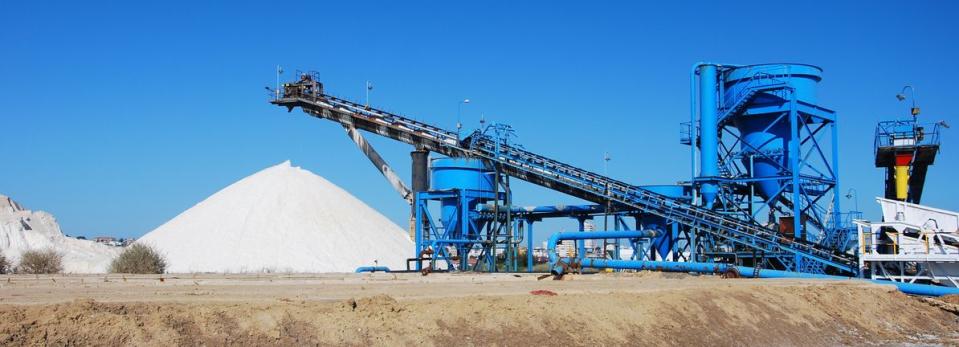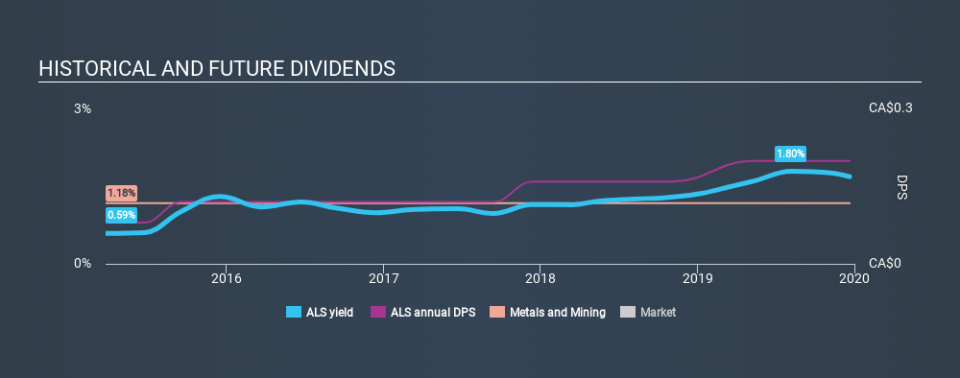What To Know Before Buying Altius Minerals Corporation (TSE:ALS) For Its Dividend

Is Altius Minerals Corporation (TSE:ALS) a good dividend stock? How can we tell? Dividend paying companies with growing earnings can be highly rewarding in the long term. Unfortunately, it's common for investors to be enticed in by the seemingly attractive yield, and lose money when the company has to cut its dividend payments.
With a 1.7% yield and a five-year payment history, investors probably think Altius Minerals looks like a reliable dividend stock. A low yield is generally a turn-off, but if the prospects for earnings growth were strong, investors might be pleasantly surprised by the long-term results. The company also bought back stock during the year, equivalent to approximately 0.9% of the company's market capitalisation at the time. Some simple research can reduce the risk of buying Altius Minerals for its dividend - read on to learn more.
Click the interactive chart for our full dividend analysis
Payout ratios
Companies (usually) pay dividends out of their earnings. If a company is paying more than it earns, the dividend might have to be cut. Comparing dividend payments to a company's net profit after tax is a simple way of reality-checking whether a dividend is sustainable. While Altius Minerals pays a dividend, it reported a loss over the last year. When a company recently reported a loss, we should investigate if its cash flows covered the dividend.
Altius Minerals paid out 51% of its cash flow as dividends last year, which is within a reasonable range for the average corporation.
Is Altius Minerals's Balance Sheet Risky?
Given Altius Minerals is paying a dividend but reported a loss over the past year, we need to check its balance sheet for signs of financial distress. A rough way to check this is with these two simple ratios: a) net debt divided by EBITDA (earnings before interest, tax, depreciation and amortisation), and b) net interest cover. Net debt to EBITDA is a measure of a company's total debt. Net interest cover measures the ability to meet interest payments. Essentially we check that a) the company does not have too much debt, and b) that it can afford to pay the interest. Altius Minerals has net debt of 1.88 times its EBITDA, which we think is not too troublesome.
Net interest cover can be calculated by dividing earnings before interest and tax (EBIT) by the company's net interest expense. Interest cover of 2.38 times its interest expense is starting to become a concern for Altius Minerals, and be aware that lenders may place additional restrictions on the company as well.
Consider getting our latest analysis on Altius Minerals's financial position here.
Dividend Volatility
From the perspective of an income investor who wants to earn dividends for many years, there is not much point buying a stock if its dividend is regularly cut or is not reliable. Altius Minerals has been paying a dividend for the past five years. During the past five-year period, the first annual payment was CA$0.08 in 2014, compared to CA$0.20 last year. This works out to be a compound annual growth rate (CAGR) of approximately 20% a year over that time.
Altius Minerals has been growing its dividend quite rapidly, which is exciting. However, the short payment history makes us question whether this performance will persist across a full market cycle.
Dividend Growth Potential
While dividend payments have been relatively reliable, it would also be nice if earnings per share (EPS) were growing, as this is essential to maintaining the dividend's purchasing power over the long term. Strong earnings per share (EPS) growth might encourage our interest in the company despite fluctuating dividends, which is why it's great to see Altius Minerals has grown its earnings per share at 31% per annum over the past five years.
Conclusion
To summarise, shareholders should always check that Altius Minerals's dividends are affordable, that its dividend payments are relatively stable, and that it has decent prospects for growing its earnings and dividend. We're not keen on the fact that Altius Minerals paid dividends despite reporting a loss over the past year, although fortunately its dividend was covered by cash flow. Next, earnings growth has been good, but unfortunately the company has not been paying dividends as long as we'd like. In sum, we find it hard to get excited about Altius Minerals from a dividend perspective. It's not that we think it's a bad business; just that there are other companies that perform better on these criteria.
Companies that are growing earnings tend to be the best dividend stocks over the long term. See what the 3 analysts we track are forecasting for Altius Minerals for free with public analyst estimates for the company.
We have also put together a list of global stocks with a market capitalisation above $1bn and yielding more 3%.
If you spot an error that warrants correction, please contact the editor at editorial-team@simplywallst.com. This article by Simply Wall St is general in nature. It does not constitute a recommendation to buy or sell any stock, and does not take account of your objectives, or your financial situation. Simply Wall St has no position in the stocks mentioned.
We aim to bring you long-term focused research analysis driven by fundamental data. Note that our analysis may not factor in the latest price-sensitive company announcements or qualitative material. Thank you for reading.

